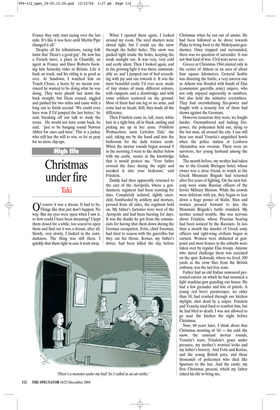Christmas under fire
Taki
Of course it was a dream. It had to be. Things like that just don’t happen. No way. But my eyes were open when I saw it, so how could I have been dreaming? I kept them closed for a while, too scared to open them and find out it was a dream, after all. Slowly, very slowly, I looked in the semidarkness. The thing was still there. I quickly shut them tight in case it went away. When I opened them again, I looked around my room. The steel shutters were closed tight, but I could see the snow through the bullet holes. The snow was packed tight inside the holes, keeping the weak sunlight out. It was very, very cold and eerily silent. Then I looked again, and in the growing light it was there, unmistakably so, and I jumped out of bed screeching with joy and ran towards it. It was the most beautiful castle I’d ever seen, made of tiny stones of many different colours, with ramparts and a drawbridge and with some soldiers scattered on the ground. Most of them had one leg or no arms, and some had no heads. Still, they made all the difference.
Then Fräulein came in, tall, erect, white hair in a tight bun, all in black, smiling and picking me up in her arms. ‘Fröhliche Weihnachten, mein Liebchen Taki,’ she said, taking me by the hand and into the bathroom for the daily torture scrub. When the mortar rounds began around 8 in the morning, I went to the shelter below with my castle, secure in the knowledge that it would protect me. ‘Your father crossed the lines during the night and sneaked it into your bedroom,’ said Fräulein.
Daddy had then apparently returned to the east of the Acropolis, where a gendarmerie regiment had been resisting for days. Completely isolated, tightly encircled, bombarded by artillery and mortars, pressed from all sides, the regiment held on. My father’s factories were west of the Acropolis and had been burning for days. It was the thanks he got from the communists for having shut them down during the German occupation. Fotis, chief foreman, had tried to reason with the guerrillas but they cut his throat. Kostas, my father’s driver, had been killed the day before Christmas when he ran out of ammo. He had been followed as he drove towards Plaka to bring food to the Makriyanni gendarmes. Once trapped and surrounded, there was no question of surrender. It was not that kind of war. Civil wars never are.
Greece at Christmas 1944 existed only in the centre of Athens in an area of about four square kilometres. General Scobie was directing the battle, a very uneven one as Athens was flooded with bands of Elas (communist guerrilla army) snipers, who not only enjoyed superiority in numbers, but also held the initiative everywhere. They had overwhelming fire-power and fought with a tenacity few of them had shown against the Germans.
However tenacious they were, we fought harder. Outnumbered and lacking firepower, the policemen held out, dying to the last man, all around the city. I can still hear our maid Venetia’s anguished howls when the police station at Leoforos Alexandras was overrun. There were no survivors, her young husband among the fallen.
The month before, my mother had taken me to the Grande Bretagne hotel, whose owner was a close friend, to watch as the Greek Mountain Brigade had returned after five years of fighting. On the next balcony were some Russian officers of the Soviet Military Mission. While the crowds were delirious with joy, they began to tear down a huge poster of Stalin. Men and women pressed forward to kiss the Mountain Brigade’s battle standard. My mother sensed trouble. She was nervous about Fräulein, whose Prussian bearing had been noticed by the Russians. In less than a month the murder of Greek army officers and right-wing civilians began in earnest. Women were abducted at gunpoint and most houses in the suburbs were taken over by regular Elas troops. Anyone who dared challenge them was executed on the spot. Kolonaki, where we lived, 100 yards as the crow flies from the British embassy, was the last free zone.
Father had an old Italian armoured personnel-carrier on which he had mounted a light machine-gun guarding our house. He had a few grenades and lots of pistols. A young red beret paratrooper, no older than 18, had crashed through our kitchen skylight, shot dead by a sniper. Fräulein and Venetia tried hard to comfort him, but he had bled to death. I was not allowed to go near the kitchen the night before Christmas.
Now, 60 years later, I think about that Christmas morning of ’44 — the cold, the snow, the constant mortar rounds, Venetia’s tears, Fräulein’s grace under pressure, my mother’s worried looks and my father’s bravery. And Fotis and Kostas, and the young British para, and those thousands of policemen who died like Spartans to the last. And the castle, my first Christmas present, which my father risked his life to bring me.

















































































 Previous page
Previous page